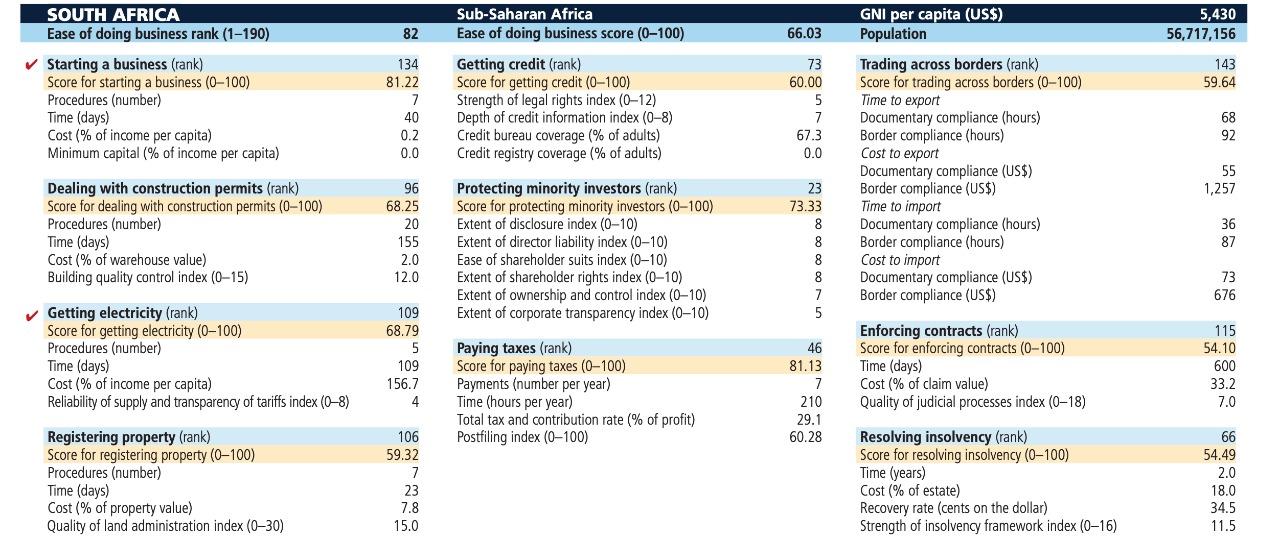Ahead of the elections, the ANC government made two promises to South Africans: to restore a culture of ethics and accountability and to fix the economy. In terms of fixing the economy the president made specific commitments – to create 275,000 new jobs a year, is just one example. And then, this promise:
“We are urgently working on a set of priority reforms to improve the ease of doing business by consolidating and streamlining regulatory processes, automating permit and other applications, and reducing the cost of compliance.” – President Cyril Ramaphosa, State of the Nation Address, February 2018.
In his State of the Nation Address in February 2018, President Cyril Ramaphosa noted that South Africa was ranked 82nd out of 190 countries tracked in the World Bank’s annual Ease of Doing Business report. While generally, Africa does not fare well in this report, there are exceptions in Rwanda, ranked 29th and Kenya, ranked 61st.
In 2009 South Africa was ranked 32nd.

“We have set ourselves the target of being among the top 50 global performers within the next three years,” the president said in the speech.
Was this political rhetoric or not?
The answer matters. The economic health of a country is measured not only in macroeconomic terms (which are pretty dire at present) but also by other factors that shape our daily economic activity – laws, regulations and institutional arrangements.
To measure how easy it is to conduct business in a country, the World Bank measures 10 indicators including business regulation, the extent of legal protection of property, the flexibility of employment regulation, the tax burden on businesses, and gauges the regulatory outcomes.
Economic activity requires rules and regulations that are efficient, accessible, and simple to implement. While attracting inward investment is a priority, one also wants to make it so easy to do business that every citizen wants in on the action.
When regulation is onerous, levels of informality are higher, which comes at a cost as firms in the informal sector grow more slowly, have less access to credit, and employ fewer workers.
Business Maverick spoke to the Department of Trade and Industry’s head of InvestSA, Yunus Hoosen – who, together with the director-general, Lionel October, is responsible for driving this agenda – to find out what, if anything, is happening.
As it turns out, this is not a forgotten promise.
“InvestSA is leading a joint team that includes the Presidency, National Treasury and the Department of Planning, Monitoring and Evaluation to address the barriers that frustrate investors,” says Hoosen.
“These include policy, legal, regulatory and administrative issues, which requires not just government-wide collaboration, but partnership with the private sector too.”
As a first step, InvestSA has signed a co-operation agreement with the World Bank to work on reform action plans for each of the indicators that combine to make up the ranking.
“We have gone through each one and identified the bottlenecks. We have short-, medium- and long-term interventions.”
Against each goal, InvestSA has a budget, a time-frame and a person responsible. The team meets monthly and reports quarterly to the economics cluster – it had its first report-back on Thursday 15 August.
There are two types of bottlenecks; one that requires policy and legislative changes and one that requires changes to business processes.
“Where South Africa has lagged is we have not reformed our business processes, procedures, the number of steps it takes to complete a process and turnaround time,” Hoosen says.
However, “with a common vision, change management and automation we will leapfrog over a number of countries.”
Technical Working Groups (TWGs) have been established to begin work in five of the indicators: Starting a business, paying taxes, registering property, trading across borders, and dealing with construction permits.
Registering a business takes 40 days in South Africa if you are lucky. In New Zealand, which ranks first, it takes five days. While the process involves seven theoretically simple steps, each requires mounds of paperwork: reserving the company name with the Companies and Intellectual Property Commission (CIPC) – three days; register at the CIPC – five days; open a bank account – one day; register for income tax and withholding taxes – one day; register for VAT (if necessary) – seven days; register with the Unemployment Insurance Fund – five days, and register with the Compensation Fund – 30 days.
“We are pioneering e-government services for company registration,” says Hoosen. “In October 2019, CIPC will launch a Bizportal as part of the first phase of our digitisation roll-out.”
Domestic firms will be able to get company registration, domain name, BBBEE certificate and SARS registration online via the portal or a mobile application.
The second phase will include the digitisation of the Unemployment Insurance Fund, the Compensation Fund and a link to South African banks.
“Within a year we believe we will have the whole process integrated on to one platform. These e-government services will improve turnaround time and service delivery, which will propel South Africa into the top quartile of the rankings on ‘starting a business’,” Hoosen says.
While the technical working groups have begun work on the five indicators, Hoosen says the most work has been done on “starting a business”.
“This is our priority. Here we rank 134th out of 190 countries.”
It won’t come as a surprise to learn that ease of property transfer and registration is another area where South Africa scores poorly – 106/190 to be exact. Reforming this area requires changes to legislation and process improvements from municipalities to SARS.
“In SA one deed is checked three times. Globally that is unheard of. In the Netherlands, the process is automated,” Hoosen says.
Digitising the Deeds Office, which is a “huge task,” will begin once the Electronic Deeds Registration Systems Bill is promulgated.
Just thinking about getting municipalities to issue rates clearance certificates, which one needs to transfer property, is enough to bring on a migraine.
“It can take anything from two weeks to two months,” says Nick Kassier, an attorney within Shepstone & Wylie’s property department. “It becomes more complicated if there is a problem with assessing the property, as communication with the rates department is usually difficult and very slow.”
When it comes to dealing with construction permits, the City of Johannesburg, (which is the proxy for the validation and assessment of SA’s rankings), has introduced its one-stop-shop for site development plans and is now focusing on implementing an online permitting system that will serve as a virtual one-stop-shop. In the medium term, a national standard has to be developed for a construction permit.
Hoosen recognises that some problems are more intractable than others and will take longer to resolve – changing processes and behaviour takes time after all.
However, the team is pressing ahead and will establish technical working groups this year to address the other five indicators: getting electricity, getting credit, resolving insolvencies, enforcing contracts, and protecting minority investors.
Business Maverick will stay in touch with InvestSA and will keep you updated on progress, or the lack of it. DM



















